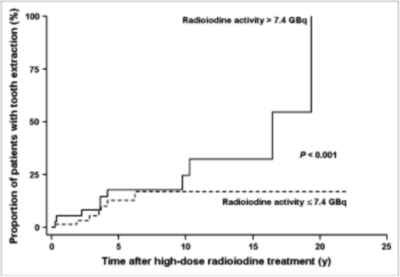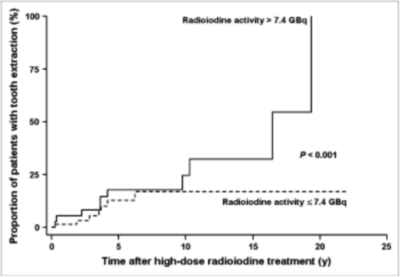
Radiation therapy for thyroid cancer can cause long-term dental disease, researchers at the University Hospital in Basel Switzerland report in this month's Journal of Nuclear Medicine.
Previous research showed that zapping thyroids with high doses of radioiodine damages salivary glands, often leading to sialadenitis and xerostomia. So the investigators contacted 176 patients who had undergone this treatment over the previous three decades and asked them and their dentists about the health of their teeth.
 |
| This graph shows the dramatic increase in tooth extractions after radiation therapy for thyroid cancer. Copyright © by the Society of Nuclear Medicine Inc. From "The Dental Safety Profile of High-Dose Radioiodine Therapy for Thyroid Cancer: Long-Term Results of a Longitudinal Cohort Study," by Martin A. Walter, et al., Journal of Nuclear Medicine 48: 1620-1625. |
They found that these patients were 98.8 percent more likely to have caries after the radiation than before it. And they were 8.14 percent more likely to have a tooth extracted for every gigabecquerel of radioiodine they had received.
So what can be done? First, the investigators suggest, only those patients who could benefit most from radioiodine therapy should undergo it. Second, patients who have had this therapy should take precautions above and beyond normal hygiene: they should be careful to avoid dehydration; they should try glandular massage to preserve their saliva flow; and they should be cautious with anticholinergic drugs, which can also cause xerostomia.















